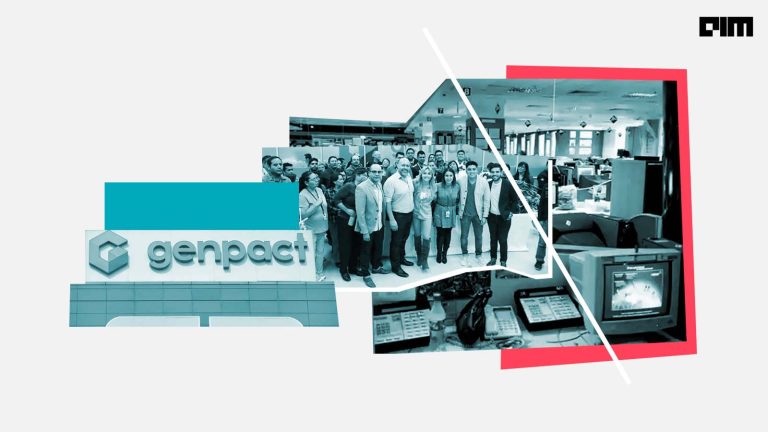With the massive volume of AI solutions at play, separating actual impactful work from all the hype surrounding AI becomes crucial. “There’s just so much noise out there. And there’s so much innovation. It’s hard to tell fact from fiction,” said Edmund DeLussey, global enterprise leader at Genpact, during a keynote at AIM’s MachineCon Summit in New York.
Five-Principle Approach
Genpact emphasises a strategic approach grounded in five fundamental principles to succeed with generative AI.
The first is identifying the right projects by analysing vast amounts of data to uncover trends and evaluate outcomes. The company recommends creating a centre of excellence (CoE) to develop expertise, assess infrastructure needs, and select promising use cases. This approach has enabled Genpact to drive innovative solutions internally, as well as for its clients.
The second principle is embedding AI into processes. A seamless integration into existing workflows empowers decision-makers with real-time insights. A case in point is Genpact’s work with a media conglomerate, where they used GenAI to create a superintelligent assistant, boosting customer satisfaction and sales by providing real-time recommendations.
Prioritising data governance and responsible AI is the third principle. Establishing a strong data foundation and ethical practices enables fair and trustworthy AI solutions. Genpact’s responsible AI framework, illustrated by their collaboration with a global bank, demonstrates how sound governance can streamline processes and enhance transparency.
>> Read insights from 550 senior leaders at the forefront of the AI revolution
The fourth principle involves building a robust technical architecture, which includes scalable infrastructure and effective model management. Genpact’s work with a leading brewing company shows how a strong data platform can improve accuracy, productivity, and decision-making, driving digital transformation.
Finally, enabling a scalable operating model is crucial. Standardising processes and developing adaptable teams allow organisations to respond quickly to changing needs. Genpact’s work with a global retailer, which significantly reduced supplier disputes through enhanced data processes, highlights the effectiveness of this approach.
AI Across Sectors
Besides discussing the length and breadth of AI applications across industries like life sciences, consumer goods, and automobiles, DeLussey also touched upon the challenge of bringing AI to a person, or rather, how AI would be accessible to people.
“One of the things we need to be thinking about is how do we bring AI to a person? How do we do what Microsoft is trying to do with their Copilot that they just released in beta…? How do you use a tool like that to help with busy areas of finance [and other business functions]?” said DeLussey.
AI for People
While talking about bringing AI to employees and customers, DeLussey mentioned that one of Genpact’s partners, in collaboration with Salesforce, was developing an AI service management platform for an auto manufacturer.
The AI system aggregated data on individual car services, warranties and other relevant information. This helped service technicians quickly identify the correct repairs and avoid the hassle of a customer repeatedly talking about the vehicle’s service history or searching the web for those details.
“This [AI consolidating and summarising data] is an area we’re really excited about. We think there’s going to be a ton of innovation in this space, and it’s going to enable many people to do better work,” said DeLussey. He believes the technology will not only boost productivity but also increase revenues.
AI in Healthcare
DeLussey also shed light on AI in drug discovery and its advancement over the years. “In 2015, there was exactly one AI-designed drug in clinical trials, but by the end of 2023, there were 67. As of now, there’s not a single drug that has actually made it out into the market yet, but it’s only a matter of time,” he said.
The FDA has approved approximately 700 models and developed new methods to streamline the process. With advancements in protein folding, such as Google DeepMind’s AlphaFold 3 which delivers a 50% prediction accuracy, AI models assisting drug discoveries will only accelerate.
Interestingly, DeLussey brought sector-focused solutions that AI companies are working on to attention. In healthcare verticals, big-tech companies, such as Microsoft and Google, are building language models to assist in the medical field. Many startups, too, are working in this space.
DeLussey also discussed how consumer product companies use AI to create new food items. For example, he emphasised how Unilever has developed zero-salt alternatives using different AI combinations and released a vegan version of Hellmann’s mayonnaise that tastes like regular mayonnaise.
Moreover, consumer product companies have also been using AI to minimise waste and improve sustainability. DeLussey gave the example of chocolate manufacturer Mars, which is using AI to improve its sustainability strategies, like using recyclable paper wrappers instead of plastic.
AI as the Solution
Genpact is prioritising AI and positioning itself as an AI-first company. This means that whenever a company approaches them with a problem, they first ask their team to consider how AI can be applied to solve the problem.
Interestingly, Genpact’s AI-focused approach is paying off. In its Q2 2024 earnings, the company posted promising numbers with data-tech-AI contributing $546 million, or 46%, to the quarter’s total revenue.
However, DeLussey warned against a one-size-fits-all approach to AI. He noted that while some companies are leading with AI, others need to adopt it gradually. The key is to understand how AI can fundamentally transform work and then strategically implement it where it can deliver lasting value.

























